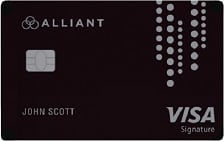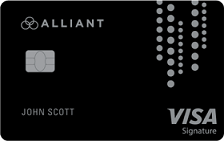Filter Options
×-
-
Unselect all
-
Unselect all
-
Unselect all

Showing 149 Cards
Sort By Column Name:
PenFed Power Cash Rewards VISA Signature® Card
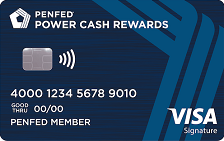
PenFed Power Cash Rewards VISA Signature® Card
- 17.99% variable based on creditworthiness and the Prime Rate Regular Purchase APR
- 17.99% Balance Transfer APR
- 17.99% Cash Advance APR
At a Glance
When you apply for the PenFed Power Cash Reward VISA Signature® from Pentagon Federal Credit Union, you may find yourself quoting the inimitable RZA to say, “Cash Back Rules Everything Around Me.” This versatile cash back credit card earns cash back for every purchase with no caps or limits. Cardholders can earn between 1.5% and 2% cash back (if they qualify) when they use their card on everyday purchases.
- Best Benefits
- Rates & Fees
- Why Should You Apply?
- 1.5% cash back on all purchases made with your card 2% cash back for PenFed Honors Advantage members
- 0% introductory APR on balance transfers for 12 months
- Earn a $100 statement credit when you spend $1,500 in the first 90 days
- No annual fees, no foreign transaction fees, no caps, no limits
- Regular Purchase APR: 17.99% variable based on creditworthiness and the Prime Rate
- Intro Balance Transfer APR: 0% for 12 months from account opening date
- Balance Transfer APR: 17.99%
- Balance Transfer Transaction Fee: 3% of the transactio
- Cash Advance APR: 17.99%
- Penalty APR: 17.99%
- Late Payment Penalty Fee: Up to $28
- Return Payment Penalty Fee: Up to $25
- You want cash back on everyday purchases with no rotating categories
- You want to redeem rewards with flexibility either as a statement credit or deposited into a financial institution account
- You want to save on fees such as annual fees and foreign transaction fees
- You plan on spending an average of $2,500 a month to maximize annual rewards
Valley Strong Visa Platinum Card
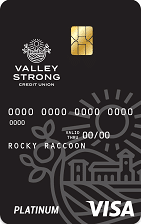
Valley Strong Visa Platinum Card
- 13.5% to 17.9% variable based on creditworthiness and the Prime Rate Regular Purchase APR
- 13.5% to 17.9% variable based on creditworthiness and the Prime Rate Balance Transfer APR
- 13.5% to 17.9% variable based on creditworthiness and the Prime Rate Cash Advance APR
At a Glance
The Valley Strong Visa Platinum Card is one of two credit cards that Valley Strong Credit Union offers its members. This credit card features no annual fee and no fees on balance transfers. In addition, cardholders can take advantage of a lower-than-average interest rate. Keep reading to learn more about the details of this card.
- Best Benefits
- Rates & Fees
- Why Should You Apply?
- No annual fee
- No balance transfer fee
- Competitive interest rates
- Roadside dispatch
- Regular Purchase APR: 13.5% to 17.9% variable based on creditworthiness and the Prime Rate
- Balance Transfer APR: 13.5% to 17.9% variable based on creditworthiness and the Prime Rate
- Cash Advance APR: 13.5% to 17.9% variable based on creditworthiness and the Prime Rate
- Cash Advance Transaction Fee: Either $10 or 2% of the amount of each cash advance, whichever is greater
- Foreign Transaction Fee: 1% of the transaction amount in U.S. dollars
- Late Payment Penalty Fee: $10
- Return Payment Penalty Fee: $15
- You're already a member of Valley Strong Credit Union or related to a member
- You live and/or work in several Central California counties
- You don’t want to pay an annual fee
- You don’t want to pay fees for balance transfers
PenFed Gold Visa® Card

PenFed Gold Visa® Card
- 16.99% to 17.99% variable based on creditworthiness and the Prime Rate Regular Purchase APR
- 17.99% Balance Transfer APR
- 17.99% Cash Advance APR
- 0% for the first 15 months from account opening date Intro Purchase APR
At a Glance
If minimizing the cost of carrying a credit card balance is at the forefront of your mind, consider the PenFed Gold Visa® Card which features PenFed’s lowest APR, no annual fee, plus no interest on balance transfers for the first 12 months.
- Best Benefits
- Rates & Fees
- Why Should You Apply?
- Lowest APR of PenFed credit cards
- No cash advance fees - ever
- 0% APR on balance transfer for 12 months
- Intro Purchase APR: 0% for the first 15 months from account opening date
- Regular Purchase APR: 16.99% to 17.99% variable based on creditworthiness and the Prime Rate
- Intro Balance Transfer APR: 0% for the first 15 months from account opening date
- Balance Transfer APR: 17.99%
- Balance Transfer Transaction Fee: 3% of the amount of each transfer
- Cash Advance APR: 17.99%
- Penalty APR: 17.99%
- Late Payment Penalty Fee: Up to $28
- Return Payment Penalty Fee: Up to $25
- You typically carry a credit card balance
- You rely on cash advances to help make ends meet
- You are able to spend $1,000 within the first 90 days of opening an account
- You're already a PenFed member or are eligible to join the credit unio
Onyx Mastercard®
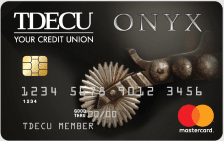
Onyx Mastercard®
- 9.50% to 17.50% variable based on creditworthiness and the Prime Rate Regular Purchase APR
- 9.50% to 17.50% variable based on creditworthiness and the Prime Rate Balance Transfer APR
- 17.50% variable based on the Prime Rate Cash Advance APR
- 0% for 6 months Intro Purchase APR
At a Glance
Earn 2% cash back rewards and enjoy no hidden fees with the impressive Onyx Mastercard® from Texas Dow Employees Credit Union. The no annual fee card offers big credit limits, an even bigger rewards cap, and more.
- Best Benefits
- Rates & Fees
- Why Should You Apply?
- No annual fee
- No foreign transaction fees
- No fees for balance transfers or cash advances
- Earn 2% on all eligible purchases
- Intro Purchase APR: 0% for 6 months
- Regular Purchase APR: 9.50% to 17.50% variable based on creditworthiness and the Prime Rate
- Intro Balance Transfer APR: 0% for 12 months
- Balance Transfer APR: 9.50% to 17.50% variable based on creditworthiness and the Prime Rate
- Cash Advance APR: 17.50% variable based on the Prime Rate
- Late Payment Penalty Fee: Up to $25
- Return Payment Penalty Fee: Up to $25
- You're a current member of TDECU or qualify for membership
- You have excellent credit
- You want a versatile rewards card that also doubles as a balance transfer credit card
- You do't want to pay an annual fee
PenFed Platinum Rewards VISA Signature® Card

PenFed Platinum Rewards VISA Signature® Card
- 17.99% variable based on creditworthiness and the Prime Rate Regular Purchase APR
- 17.99% Balance Transfer APR
- 17.99% Cash Advance APR
At a Glance
The PenFed Platinum Rewards VISA Signature® is big on gas and groceries; earn 5x points per dollar spent on purchases made at the pump, 3x points for grocery purchases, and 1x points for all other purchases. Take advantage of a great introductory offer – 0% APR for balance transfers for up to 12 months and a special bonus statement credit as you earn points on everyday purchases towards travel, shopping and gift cards.
- Best Benefits
- Rates & Fees
- Why Should You Apply?
- 5X points per dollar spent on gas at the pump and EV charging stations and 3X points on groceries. 1X points on all other purchases
- 15,000 bonus points when you spend $1,500 in first 90 days of card account opening
- 0% intro APR on balance transfers for 12 months after account opening
- No annual fees and no foreign transaction fees
- Regular Purchase APR: 17.99% variable based on creditworthiness and the Prime Rate
- Intro Balance Transfer APR: 0% for 12 months from account opening date
- Balance Transfer APR: 17.99%
- Balance Transfer Transaction Fee: 3% of the transfer amount
- Cash Advance APR: 17.99%
- Penalty APR: 17.99%
- Late Payment Penalty Fee: Up to $28
- Return Payment Penalty Fee: Up to $25
- You spend money on gas and groceries often
- You will spend $1,500 in the first 90 days to earn a 15,000 bonus points
- You want a card with no annual fees and no foreign transaction fees
- You want to transfer a large balance with no interest for 12 months
You've viewed 5 of 149 credit cards
What is a Credit Union?
A credit union is a financial cooperative that is owned and operated by its members. It is designed to provide a range of financial services, including savings and checking accounts, loans, and other financial products.
Similarly, credit union credit cards are offered by credit unions, which are not-for-profit financial institutions owned by their members. These credit cards work similarly to traditional bank-issued credit cards, allowing you to make purchases and borrow money up to a certain credit limit.
How Do Credit Unions Differ from Banks?
As mentioned, credit unions are community banks and financial institutions. Here’s a detailed breakdown of how credit unions differ from traditional banks:
Ownership and Structure:
- Credit Union:Credit unions are owned by their members, the customers. Members elect a volunteer board of directors and have a say in how the credit union is run.
- Traditional Bank:Traditional banks are typically owned by shareholders and run by a paid board of directors. Customers do not have a direct ownership stake in the bank.
Profit Motive
- Credit Union:Credit unions are not-for-profit organizations. This means that any profits made are returned to members through better interest rates on savings, lower fees, and competitive loan rates.
- Traditional Bank:Traditional banks are for-profit entities that aim to maximize shareholder value. This can result in higher fees and lower interest rates for customers.
Membership and Eligibility
- Credit Union:Membership in a credit union is often based on a common bond, such as employment in a certain industry, living in a specific area, or belonging to a particular organization. However, many credit unions have expanded their membership criteria to be more inclusive.
- Traditional Bank:Traditional banks are open to the general public, and anyone can become a customer regardless of their affiliations or, in some instances, geographic location.
Services
- Credit Union:Credit unions offer a similar range of services to traditional banks, including savings and checking accounts, loans, credit cards, and other financial products. They may also have a focus on financial education and community initiatives.
- Traditional Bank:Traditional banks also provide a wide range of financial services, including investment products, wealth management services, and international banking.
Regulation
- Credit Union:Credit unions are regulated at the state or federal level, and they are often subject to oversight by the National Credit Union Administration (NCUA) in the United States.
- Traditional Bank:Traditional banks are regulated by federal and state banking regulators, such as the Federal Reserve, the Office of the Comptroller of the Currency (OCC), and the Federal Deposit Insurance Corporation (FDIC).
It’s worth noting that while credit unions are not FDIC-insured, they are insured by the NCUA for up to $250,000, meaning credit unions are just as safe as your national bank.
Benefits Of a Credit Union Credit Card
Credit union credit cards feature many of the same benefits as credit cards from banks like Bank of America, Chase, or USAA. In addition, these cards provide quirks and perks that bigger banks can’t match:
Lower APR
One of the major benefits of credit union credit cards is that they tend to have lower interest rates compared to traditional bank-issued credit cards. This can save you money in the long run, especially if you tend to carry a balance on your credit card.
Lower Fees
In addition to lower interest rates, credit union credit cards often have lower fees. This can include annual fees, balance transfer fees, cash advance fees, and foreign transaction fees. By choosing a credit union credit card, you can avoid or minimize these fees, ultimately saving you money.
Personalized Customer Service Support
Credit unions are known for their personalized customer service. You can expect to receive the individual attention and support you deserve with a credit union credit card. Whether you have questions about your account or need assistance with a transaction, the credit union staff will be there to help.
Limitations of Credit Union Cards
Credit union cards offer significant value to many credit card consumers, especially when it comes to securing a great interest rate. However, there are some drawbacks to credit union cards as well. These drawbacks are most closely associated with the low-interest rates these community banks offer.
Fewer Card Options for Bad Credit
Credit unions tend to offer fewer credit products than larger banks, making it more difficult for those less-than-perfect credit to get accepted for a credit card. Due to their low APR rates and relatively small cash reserves, credit unions are more likely to expect an applicant to have excellent credit or at least good to very good credit.
Eligibility Requirements
Before applying for a credit union credit card, be sure to check your credit score to ensure you meet the credit requirements. Merely being a member isn’t enough. That said, sometimes joining a credit union can be tricky, so make sure you are eligible first.
Smaller Welcome Bonuses
Credit unions are member-owned, meaning you can expect the lowest possible rate on credit cards and loans. However, the members-first approach often results in smaller introductory bonuses on cards.
Longer Application Process
Because credit unions require joining the union before applying, many credit card applications take significantly longer than applications with bigger banks.
Tips for Using Your Credit Union Credit Card Wisely
Using your credit union credit card wisely can help you maximize its benefits while avoiding financial pitfalls. Here are some tips for using your card responsibly:
- Pay your balance in full each month: Aim to pay your credit card balance in full each month. This will help you avoid paying interest on your purchases and ensure you’re not accumulating unnecessary debt. By paying your balance in full, you can enjoy the convenience of a credit card without the burden of interest charges.
- Keep your credit utilization low: Credit utilization refers to the percentage of your available credit that you’re using. Keeping your credit utilization below 30% is generally recommended to maintain a good credit score. By keeping your balances low relative to your credit limit, you demonstrate responsible credit management to lenders.
- Avoid unnecessary debt: While credit cards can be convenient for making purchases, it’s important to avoid unnecessary debt. Before making a purchase, consider whether you can pay off the balance in full when the bill arrives. If not, waiting until you have the funds available may be best.
- Review your statements: Take the time to review your credit card statements regularly. This will help you identify any errors or fraudulent charges and ensure that your balances are accurate. If you notice any discrepancies, contact your credit union immediately to address the issue.
- Understand your rewards program: If your credit union credit card offers a rewards program, like CU Rewards or other group rewards plans, take the time to understand how it works. Familiarize yourself with the types of rewards offered, how they can be redeemed, and any limitations or restrictions.
Conclusion
Choosing a credit card from a credit union can offer several advantages, including potentially lower fees, competitive interest rates, and a member-focused approach to customer service. Credit unions often emphasize financial education and community involvement, which can appeal to individuals seeking a more personalized banking experience. However, it’s important to consider the potential limitations, such as membership eligibility requirements and a potentially more limited branch and ATM network compared to larger banks.
When considering a new credit union credit card, it’s essential to carefully assess its terms and features, including the interest rates, fees, rewards programs, and any additional benefits. You can make informed decisions that align with their financial needs and goals by conducting thorough research and comparing various credit union credit card options.
Check out more
Rewards Credit Cards
Editorial Disclosure – The opinions expressed on BestCards.com's reviews, articles, and all other content on or relating to the website are solely those of the content’s author(s). These opinions do not reflect those of any card issuer or financial institution, and editorial content on our site has not been reviewed or approved by these entities unless noted otherwise. Further, BestCards.com lists credit card offers that are frequently updated with information believed to be accurate to the best of our team's knowledge. However, please review the information provided directly by the credit card issuer or related financial institution for full details.

